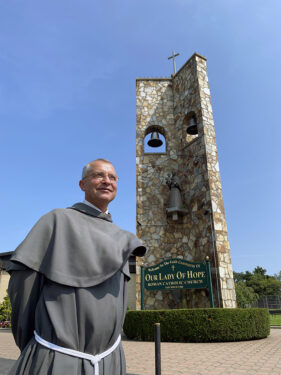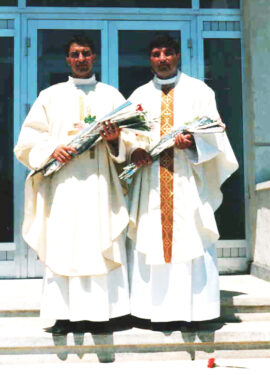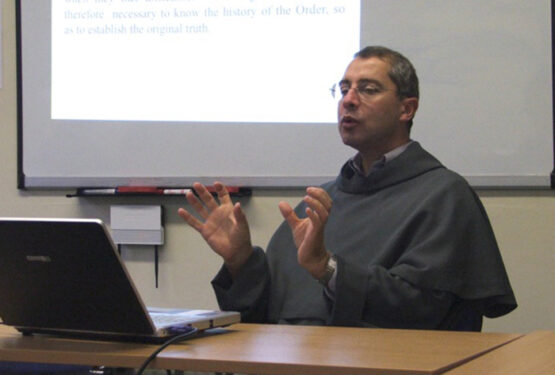
This article is the third of a four-part series profiling visiting priests in the Diocese of Brooklyn.
MIDDLE VILLAGE — When Romania’s communist regime fell in 1989, Stefan Acatrinei — then a 23-year-old electrician — suddenly realized he could pursue his lifelong dream to be a priest.
Communist-imposed restrictions on the Church allowed only a few young men to enter seminaries each year. But, with the regime gone, the local Church experienced immense growth, and the young electrician answered his inner call to join the ministry.
Ordained in 1997, Father Acatrinei, a Franciscan, is now also a seminary professor.
But for several weeks each summer, Father Acatrinei experiences the joy of pastoral service as he assists the staff of Our Lady of Hope Parish in Queens.
“Here,” he said, “I do everything that the priest can do. I mean, I do baptisms, weddings, I do funerals. I go to give the holy Communion to the sick.
“I wanted to become a priest because I fell in love with the way the priests were living — administering the sacraments, being there for the people.”
Frank Corbo, a parishioner at Our Lady of Hope, commented that although Father Acatrinei has a vital position in the seminary back home, he “comes down to earth as a regular guy.”
“No matter who is in the room, he will find a talking point with everyone,” Corbo said. “He’s very quick and very astute to pick up on people and what they feel is important to them.”
“He’s here to help,” added Corbo’s wife, Linda. “That’s what he always says: ‘That’s my job. That’s what I’m here for when I come in the summer.’ And that’s what he does, over and beyond.”
‘That’s Not For Us’
Father Acatrinei praised his parents, Mihai and Elena, for teaching and exemplifying the Catholic faith to their four children.
They avoided prison by confining the family’s religious activities inside the home or in church. Those who publicly proclaimed their faith risked arrests by the secret police, Father Acatrinei said.
The Acatrinei family lived in Galbeni, a village about nine miles south of the city, Bacău, in eastern Romania. He has an older brother, Anton, who is also a Franciscan priest, a sister, Teresa, who is married with three children, and a sister Margareta, a nun.
Their father worked in a furniture factory in Bacău, and their mother was an agricultural worker during the growing and harvest seasons.
Stefan, born in 1966, said he grew up not knowing anything but the authoritarian rule.
However, his parents and grandparents longed for the days before the communist regime seized control after World War II. Back then, they could freely and publicly practice their faith.
“For us, who were born after that time, we were thinking, ‘That’s not for us,’” Father Acatrinei said. “I never thought that the regime would ever collapse.”
He said the Romanian Communist Party came to power in 1946; by 1948, it had clamped down on religion.
“They were afraid of the intellectual tradition of the Catholic Church,” Father Acatrinei explained. “So then they started to do things like putting the priests into jails.”
The communists, he added, knew they couldn’t outlaw religion all at once without risking widespread insurrections. Alternatively, they tried to discourage it by allowing only one priest per parish and to isolate them by banning the clergy from meeting to share ideas. They also organized activities on Sundays to divert kids from Mass.
Father Acatrinei said the plan was to create an atmosphere where people would gradually lose interest in the Church and God.
“Living in an atheistic society, you were hearing everywhere — on the radio, or television, even in school — that there is no God,” he said.
“But,” he added, “the Church was the only reality which was giving us another perspective — another side of human life. And because our parents were good Catholics, they trained us that without faith, we cannot have hope during this life.
“They were very keen on instructing us about religious values. For them, it was very important to start the day with prayer. And, before going to bed, saying our prayers. And, if it was possible, every day to go to Mass.
“And we loved it.”
Subsequently, Father Acatrinei wanted to be a priest.
Still, he could not get past the regime’s tight control on seminary admissions.
He became an electrician instead and landed a good job at a hydropower plant. He also worked as an electrician at a radar site while completing his compulsory service in the Romanian military.
A New Horizon
But, by the late 1980s, the communists were losing control of Romania. President Nicolae Ceaușescu tried to end Romania’s national debt. To get the money, he ordered ramped-up exports of critical resources, including food.

Father Acatrinei said his family members managed because they lived in a village where they could tend a garden and raise a few chickens and pigs. But in the cities, thousands of people starved to death.
Ceaușescu ordered violent crackdowns on protests, but he fled in December 1989 during what would be called the “Romanian Revolution.” Military personnel defected and captured the president. He was tried, convicted, and executed on charges of economic sabotage and genocide.
By this time, Stefan had resumed working at the power plant. He was returning home with a Christmas tree when he learned the regime had fallen. His parents were ecstatic, but the news briefly stunned him.
“It was unexpected,” he said. “Of course, I was taken by surprise. (But) I was very happy because I had a new horizon in front of me.”
Father Acatrinei joined the Franciscan community as a seminarian in 1990; his ordination was seven years later. But his nation’s demand for clergy spurred the need for more seminary professors — a role Father Acatrinei has filled for most of his career.
He is a longtime professor of theology and spirituality at the Franciscan Roman-Catholic Theological Institute. It is in Roman, a city in the central part of Moldavia, a region of Romania. In addition, he is editor of the seminary’s journal, “Franciscan Studies”.
Father Acatrinei also taught at the Franciscan International Study Centre in Canterbury, United Kingdom, and performed summer service work in Germany.
‘Wherever God Needs Me’
While touring the U.S., he visited fellow Franciscans. One of them referred him to an opportunity to help out at Our Lady of Hope. As a result, he has been making these annual summer visits since 2011.
“People here are very, very nice, very welcoming,” he said. “Most of the people are speaking two languages, or even three languages, so they are very tolerant if you are not speaking English properly.”

Father Acatrinei began learning English at age 40. He also speaks Romanian, Hungarian, German, and Italian. Parishioners Gino and Anna Dagri appreciate his varied language skills.
“He knows that we are Italian, so he speaks Italian to us,” the husband said. “But my wife and I, unfortunately, we’re not feeling well. My wife has problems walking, so we stay home. But to us, God sent a gift — Father Stefan. He takes us Communion every morning.
“That’s what a good friend is all about.”
Frank Corbo added that Father Acatrinei is like part of his own family.
“We started to get friendly, and we talked a lot about religious topics,” Corbo said. “Over time, I guess we developed a very close relationship — like a brother-to-brother kind of a relationship.”
Father Peter Purpura, the pastor, praised Father Acatrinei’s contributions.
“He has become part of the fabric of the parish,” the pastor said. “People know him and appreciate him. They expect him to be here every summer.”
Father Peter added he “couldn’t imagine getting anyone better” to help his staff.
“I don’t want to say that too loudly and risk losing him,” he said with a chuckle. “But he’s not just a priest that’s coming to hang out for the summer.
“He’s very generous with himself — always available and always willing to do whatever is needed.”
An example is bringing Communion to Gino and Anna Dagri.
“And I don’t have to tell him to do that,” Father Peter said. “It’s something that he just identifies on his own, and he does it.”
Father Acatrinei shared that he spent much of his career as a seminary professor “out of love.”
But, he added, his first love is pastoral work, which he hopes one day to resume fully, “wherever God needs me.”
“You see, God gave me this gift: I feel, everywhere, at home,” Father Acatrinei said. “And it was given for a reason, not just to enjoy myself, but to help others also.”
